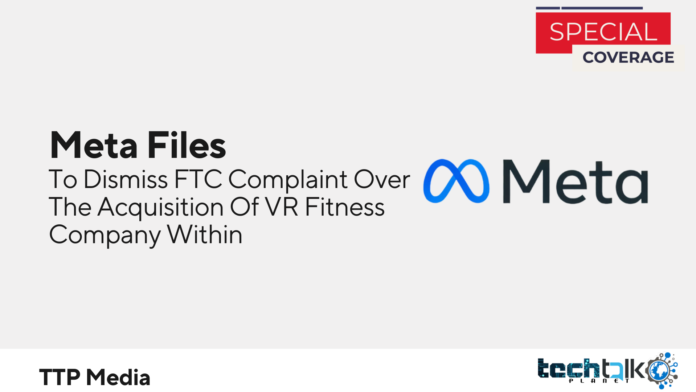
Meta filed a request to have the FTC’s lawsuit against its purchase of Within dismissed.
Supernatural, a rhythm game turned fitness software created by a Los Angeles virtual reality company, is, in our humble view, a genuinely outstanding application of VR. The FTC has expressed worry that the deal would be anticompetitive, which is understandable given Meta’s desire to acquire the business.
The attempt to unlawfully purchase a specialised fitness software that demonstrates the use of virtual reality to consumers is part of Meta and [CEO Mark] Zuckerberg’s strategy to broaden Meta’s virtual reality empire, the agency claimed in a July report.
In spite of the FTC’s lawsuit, Meta today submitted a motion to the Northern District of California court to proceed with the purchase.
The FTC first claimed that the transaction would reduce market competition for VR fitness. “Meta already plays in this larger market with its Beat Saber app, and Within does so with its premium competitor app Supernatural,” the advertising agency noted. The fierce competition that now drives the two businesses to keep developing new services and luring more consumers would be lost if this purchase were approved. However, the FTC dropped these accusations in a new complaint that was submitted last week.
If we want to be specific, Beat Saber isn’t truly a fitness software; some players just feel hot and bothered playing it since it needs rapid arm movements, but Beat Saber wasn’t designed with exercise in mind. Due to the fact that both games are rhythm games, comparisons can only be made.
Anyhow, Meta took advantage of the FTC’s less aggressive lawsuit by claiming that the complaint shouldn’t prevent the purchase. If Meta were to buy Within, the FTC would have a much harder trouble getting the combined businesses to split apart.
“Having abandoned its argument that Meta and Within compete for fitness consumers, the FTC advances only on the premise that Meta and Within could compete, and that the fear of such competition encourages Within and others to compete more fiercely,” reads a statement from Meta. However, according to legal precedence, “perceived prospective competition” hasn’t supported a vertical merger ban in court, according to the company’s attorneys.
The complaint states that “The FTC contends merely that universal fear of potential entrance by Meta is a drive to competition.”
The business Meta placed a significant wager on virtual reality; in 2021, it invested over $10 billion in its Reality Labs subsidiary, but it isn’t generating anything close to that amount in income. The corporation formerly known as Facebook introduced its high-end VR headset, the Quest Pro, during its developer conference this week. It costs $1,499.99.














































